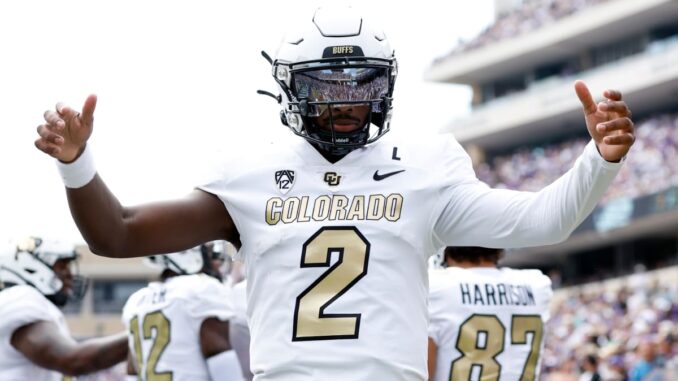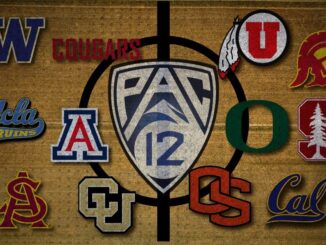
Within minutes of the kneeldown that capped Colorado’s 45-42 big win over No. 17 TCU, the college football world seemed to turn on its head.
Colorado, a team that went 1-11 just last year, had entered Fort Worth and stunned the nearly-three-touchdown favorites, who played in the national championship game just eight months ago. With it, the Buffaloes appeared to herald a new era of Colorado football, led by star quarterback Shedeur Sanders and two-way phenom Travis Hunter. And, of course, the man at the top: Deion Sanders.
In just a few hours, the conversation transformed from whether Colorado could miraculously reach bowl eligibility this year to how far it could go. The Buffaloes even reached No. 22 in the latest AP Poll. That, combined with the fiery postgame and press conference statements made by Coach Sanders, have the college football world excited to see what Colorado will do in their next game against Nebraska.
The storylines may align perfectly, but unfortunately, the stats—and history—don’t just yet. Much has been made of the Buffaloes’ impressive offensive performance against the Horned Frogs, and for good reason. From Shedeur’s 510-yard, 4-TD performance (numbers per ESPN) to FOUR wide receivers reaching the 100-yard mark, Colorado was masterful offensively. What hasn’t been dwelled on much is the other number in the final score: the 42 points TCU put up. Despite returning just three offensive starters from last year’s team (or 33% of total offensive production, according to ESPN), including the loss of their starting quarterback, top wide receiver, and top running back, TCU shredded Colorado’s defense to the tune of 541 total yards and six touchdowns. It could have been more if not for quarterback Chandler Morris throwing two red-zone interceptions.
Of particular concern for the Buffaloes should be the ease with which TCU ran all over their defense. Running back Emani Bailey rushed for 164 yards on just 14 carries, for a ridiculous 11.7 yards per carry. Meanwhile, Trey Sanders chipped in 46 yards and three touchdowns, and Morris raced into the end zone untouched from 19 yards out. Even if the Horned Frogs’ passing game was spotty, they still dominated the line of scrimmage, with 7.1 yards per carry as a team (compare this to Colorado’s pitiful 1.6 yards per rush). To its credit, the Buffaloes’ secondary held its own, holding TCU to just 279 yards through the air on 42 attempts, but it’s hard to win games consistently when being pushed around in the trenches.
If Colorado is really to be considered a contender in the already-crowded PAC-12, its defense had better collectively tightened up. These issues will undoubtedly be ameliorated, if not solved altogether, by time as the unit (which returns only two starters from last year’s Buffaloes squad, per 247Sports) gains more experience and chemistry, but there’s not much time. A Week 4 road trip to Autzen Stadium to play the Oregon Ducks (who put up 81 points themselves just last week) is immediately followed by a home game against likely top-10 USC. The Buffaloes will also have tough games against UCLA, Oregon State, and Utah later in the season.
It’s also likely too early to tell from just one game. In 2020, KJ Costello lit up the LSU Tigers, the defending champions and ranked No. 6, for an SEC-record 623 yards in his first game at Mississippi State. After that season-opening win, the Bulldogs lost their next four games en route to a 3-7 regular season record against an all-SEC schedule. While it’s unfair to make definitive predictions for Colorado from a single example, especially with the weird impacts of COVID-19 that season, it does show that the first game is not necessarily a good predictor of a team’s overall success.
Will Colorado maintain the energy they displayed against TCU for a whole season? What happens when Shedeur Sanders isn’t throwing for 500 yards? Will the run defense tighten up? How will the Buffaloes respond to their first taste of adversity? These are the questions that will determine if Colorado has a surprise season or if they struggle to achieve bowl eligibility. Assuming Colorado wins this weekend against Nebraska, we won’t really know what’s in store for the Buffaloes until the Oregon game at the earliest.
If Colorado can overcome its deficiencies and performs well against Oregon, we’ll talk. But until then, take anything you hear about Colorado’s outlook this season—Coach Prime or not—with a big shaker of salt.



